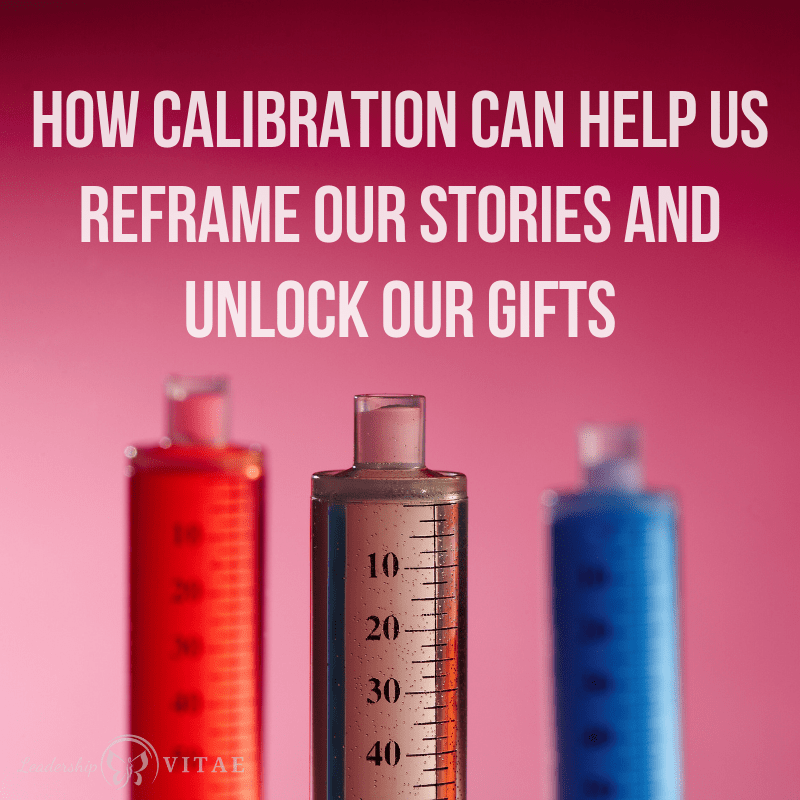
Recently, I was talking with a mentee and he mentioned that everyone he knows tends to be one way and he’s another. He had created this idea of himself as someone who is a deep-thinking, socially awkward, non-emotional introvert.
He had decided that his way was wrong, because he didn’t see a lot of others like himself. That somehow, he needed to try and be more like the “better way” that others showed up. As if all personality characteristics were binary, instead of on a spectrum, and that there was some sort of standard or norm we should all be striving for.
We’ve talked about being mirrors of each other. He reminds me of a younger version of myself, with similar self-critical thoughts. He sees me as an older, more mature version of him, someone that has begun to embrace the gifts these perceived differences really are.
During our conversation, we talked a lot about a technique called calibrating. I shared the story of a recent trip to visit family, which I’ll share here. In short, we may need to calibrate with others so we both have an understanding of our respective preferences and gifts. Otherwise, it’s easy to assume others are like us, or that we don’t fit when they aren’t.
The early narrative
I’ve shared some insights about my mother recently. We had more in common than we likely ever realized, but how we showed up was very different.
My mother was extroverted and engaging with others. She’d make fast friends with the checkout person at the store. Everyone tended to love her, but only ever on the surface. She was not one for deep friendships. I, on the other hand, only ever had a few “ride or die” friendships and was more cautious meeting anyone new.
She was someone who folks would talk to about things going on, and problems they were having. I have always been the one you called when you wanted things done.
The story I was told when I’d jump in to fix was that I was unfeeling, bullying, pushy, or any number of other unkind things. It wasn’t until relatively recently that I reframed that narrative.
I have deep emotions and am a strong empath. However, my love language is acts of service. I can quickly feel overwhelmed with affirmations and physical touch because of the depth of my emotions. However, when I channel my feelings into helping others, I can more easily show someone how much I care.
It all came together for me on a trip to help my family.
An emotional trip
I traveled to Mississippi to help my aunt as she prepared to sell the family home. I knew it would be exhausting, emotionally and physically. She had lost her husband in December, and her sister (my mother) in February. Now, she had to sell her home and let go of most of her possessions.
When I offered to help for a few days, I was called in as the “big guns.” She’s been at it for months and no one has been able to get her to budge on her clothes, jewelry, and makeup. The things she refuses to let go of but doesn’t have room to keep in excess.
I could only imagine how much she was grieving. The loss of loved ones, her home, and her possessions. While I am empathetic, I am also a very practical and logic-driven problem solver. It would be a fine line I was walking to push enough, but not too much.
I figured my key to success would be transparency. I’d share with her how I thought we should tackle something, get her buy-in, and then adjust if needed as things became too difficult. We’d start easy, pushing off hard choices until we got into a rhythm and she was better prepared to make them.
In addition to the process transparency, I was open about how I was showing up and why I was doing what I was doing. I shared my love for her, my coaching background, and when I was using certain techniques to help guide what we were doing. Including when I was practicing tough love.
It was a grueling four days, but we got through it. There’s still more to do, but I’m hopeful the choices are easier and donations go smoother.
Set expectations to calibrate
At the end of the trip, I received a lot of feedback from my aunt and her daughter, as well as other aunts and uncles. They were all appreciative, not only of what my aunt and I were able to accomplish together, but also how I helped her relationship with my cousin.
When we weren’t sorting, donating, and purging, I was bringing some coaching techniques to their relationship as well. Because I am an observer, I brought an outside perspective to how they were showing up with each other.
My fear was that I’d be seen as nosy, pushy, overbearing, and all those other negative stories I’d been told in the past. Instead, everyone saw the love. Because that’s what I led with.
I calibrated with my aunt and cousin at the start of the trip, and at each step. I set expectations up front, acknowledged and honored their grief, and prepared them for what I was doing and why. The biggest message was that I was there in love, and that any actions were meant as a gift, not a punishment.
I am someone who has been labeled and historically seen herself as socially awkward, emotionless, and too logical to interact during tough emotional situations. Yet we got through with only one outburst that led to quick apologies and reminders of the love that was guiding each of us.
Why we calibrate
Calibration is critical to environments where we want to have predictable performance with high quality. The only way to know if something is performing well is to measure it. To measure consistently, we calibrate our measuring system. For example, if you want to measure the weight of something, first calibrate your scale to ensure it will measure accurately and consistently.
The same can be said of people. If we are measuring ourselves and others against some unknown standard, we will always be “off” or out of a perceived norm. We need to understand the measurement system and then calibrate to set clear expectations.
For example, I mentioned love language earlier. There are five of them, with none better than the other. If I’m in a group of friends and family who are big on affirmations, I’m going to look like an anomaly. They might see me as uncaring, or I might judge myself as unemotional. Neither is true. To calibrate and set expectations, I can express that I care and let them know that acts of services is how I best demonstrate that caring.
I’ve written several times previously on my social awkwardness, which I am actively reframing. When surrounded by people who enjoy small talk, the perception of my discomfort might be that I’m not engaged or interested. I might be judging myself as being socially inept.
Instead, I can acknowledge my preference for a deeper connection on a shared area of interest. It’s not better or worse than those that enjoy small talk…it’s just not my gift. That’s perfectly okay as long as we calibrate and set expectations, even if it’s just with ourselves.
How to calibrate
Each time we receive feedback about how we are different, or judging ourselves (or others) for those same differences, it’s an opportunity to calibrate.
Consider the narrative being shared or internalized. If it’s negative language, what is another way to frame it?
I used to get so upset when I was accused of being hurtful when I was trying to help. That even those closest to me couldn’t see the love that was driving my actions. Now I have language for what I’m doing and why, which can diffuse or prevent the misperception of my actions.
What language can be used to positively frame something that we or others are negatively perceiving?
I do a lot of reading and research about “types.” Whether it’s Enneagram, Myers-Briggs, DISC, archetypes, love languages…you name a part of our personalities and how we show up in the world and someone has come up with a framework for it. All of them have been a way for me to try and calibrate myself relative to others, but none are a magic answer to what makes us tick.
However, in every single one of them, there is a common truth. There are all kinds of people, styles, approaches, and types. Not one of them is better than another. There is never one that we should aspire to above all others.
Our particular mix is a gift to the world. Knowing ourselves allows us to show up in spaces with awareness and intention. If our gift isn’t a fit, that doesn’t make us bad or wrong…it means we might need a new place to practice and share our gift.
Practice ownership
I love engaging as a mentor, because I usually walk away learning something new myself. In this latest conversation with my mentee, it was no different.
We talked about calibration, social awkwardness, and reframing our language to preferences. Then he shared a book and a crisp reminder of something many of us forget.
We are not bystanders in our lives. We are actors – the stars of our own story. If we find ourselves in places that don’t play to our strengths, our gifts, and our preferences, we can make a change.
In the case of conversation, if the conversation is about something we’re not particularly passionate about we can introduce a new topic. If this group isn’t interested, we can find a person or group that is.
We are not meant to solely fit into others’ preferences. Our preferences matter too, and sometimes we forget that. Especially if we find ourselves in groups where others seem similar and we are different.
Variety is the spice of life. And if we are bringing that variety, we ARE the spice. We might be the perspective needed to figure out a complex problem. Or the one the family needs to help tackle the tough emotional stuff no one else can manage.
The day we can each see our differences and the differences of others as gifts that that are additive to the world may very well be the day I can rest. Until then, I’ll keep reading, learning, and doing my best to help every person who has ever felt as I have know they belong.








